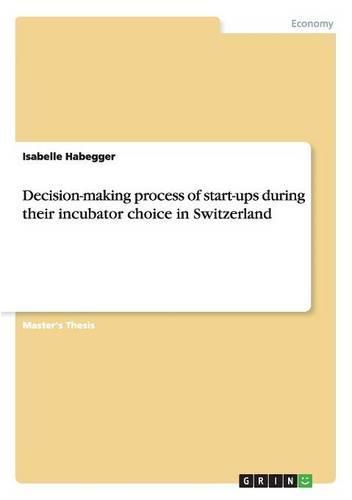Readings Newsletter
Become a Readings Member to make your shopping experience even easier.
Sign in or sign up for free!
You’re not far away from qualifying for FREE standard shipping within Australia
You’ve qualified for FREE standard shipping within Australia
The cart is loading…






Master’s Thesis from the year 2015 in the subject Business economics - Company formation, Business Plans, grade: A, Novancia Business School Paris, language: English, abstract: This following report investigates the decision-making process of Swiss start-ups during their selection of an incubator in Zurich. It explores the ways start-ups decide on an incubator, which allows introducing a model for this matter. Thus, this study is motivated by the following research question: ‘What is the decision-making process of start-ups when selecting an incubator in Switzerland’? Previous literature failed to address the combination of incubation, start-ups and decision-making. Existing literature has focused predominantly on incubators’ performance, success factors of start-ups and decision-making reasons for creating a new venture. In other words, the gap in the literature is that primary research regarding incubator selection by start-ups has not been conducted. Hence, the aim of this research is to fill this gap by identifying the trigger for a start-up’s incubator search, the information channels it uses and the criteria for decision-making, which makes it possible to develop a framework for future start-ups, and existing as well as future incubators. The outcomes were based on semi-structured interviews with 10 start-ups in Zurich. Results showed that the trigger for incubator search is office space. Furthermore, the decision-making distinguishes itself between experienced and inexperienced entrepreneurs. Experienced mostly use search engines such as Google whereas inexperienced entrepreneurs obtain information through their close social circles. Criteria for decision-making for experienced entrepreneurs are tangible services such as infrastructure and location whereas for inexperienced entrepreneurs intangible services such as networking and coaching are valuable. The findings allow introducing a model that is useful for both existing and future incubators with suggestio
$9.00 standard shipping within Australia
FREE standard shipping within Australia for orders over $100.00
Express & International shipping calculated at checkout
Master’s Thesis from the year 2015 in the subject Business economics - Company formation, Business Plans, grade: A, Novancia Business School Paris, language: English, abstract: This following report investigates the decision-making process of Swiss start-ups during their selection of an incubator in Zurich. It explores the ways start-ups decide on an incubator, which allows introducing a model for this matter. Thus, this study is motivated by the following research question: ‘What is the decision-making process of start-ups when selecting an incubator in Switzerland’? Previous literature failed to address the combination of incubation, start-ups and decision-making. Existing literature has focused predominantly on incubators’ performance, success factors of start-ups and decision-making reasons for creating a new venture. In other words, the gap in the literature is that primary research regarding incubator selection by start-ups has not been conducted. Hence, the aim of this research is to fill this gap by identifying the trigger for a start-up’s incubator search, the information channels it uses and the criteria for decision-making, which makes it possible to develop a framework for future start-ups, and existing as well as future incubators. The outcomes were based on semi-structured interviews with 10 start-ups in Zurich. Results showed that the trigger for incubator search is office space. Furthermore, the decision-making distinguishes itself between experienced and inexperienced entrepreneurs. Experienced mostly use search engines such as Google whereas inexperienced entrepreneurs obtain information through their close social circles. Criteria for decision-making for experienced entrepreneurs are tangible services such as infrastructure and location whereas for inexperienced entrepreneurs intangible services such as networking and coaching are valuable. The findings allow introducing a model that is useful for both existing and future incubators with suggestio